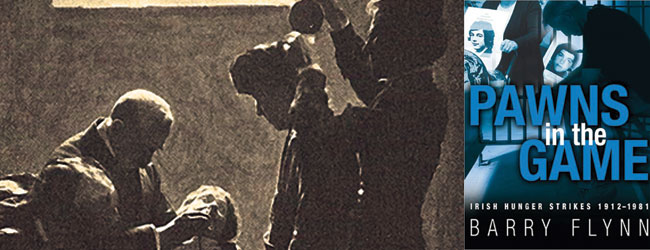16 June 2011
Hunger strikes: Suffragettes to H-Blocks
BOOK REVIEW
BY MARK MOLONEY
‘PAWNS IN THE GAME’,
BY BARRY FLYNN
(COLLINS PRESS €13/£12)
 THIS YEAR being the 30th anniversary of the 1981 Hunger Strike, it’s no surprise that some writers outside republicanism are looking at this historic period and one of the more interesting publications is without doubt Barry Flynn’s Pawns in the Game.
THIS YEAR being the 30th anniversary of the 1981 Hunger Strike, it’s no surprise that some writers outside republicanism are looking at this historic period and one of the more interesting publications is without doubt Barry Flynn’s Pawns in the Game.
And don’t be put off by the title. I had misgivings about it before I’d even turned a page because it evoked memories of previous publications by Richard O’Rawe that made outrageous and unsubstantiated claims about the actions of the republican leadership at the time. Thankfully, this work by Flynn (a BBC Radio Ulster sports correspondent) was far from my initial expectations.
This is a brief history of all of the Irish hunger strikes that have taken place between 1912 and 1981. Flynn does not go into any great detail about the background of each of the hunger strikers but instead he focuses on the cold, hard facts of each strike and the reactions of the public, the governments, the media and the political world to the events.
The book begins in 1912 with the hunger strike of suffragettes Gladys Evans and Mary Leigh, who had attempted to kill British Prime Minister Herbert Asquith with a hatchet and set fire to the Royal Theatre respectively. They were imprisoned in Dublin and force-fed for more than two months.
Flynn goes on to look at the hunger strikes during the Tan War, Civil War and beyond while also documenting the dramatic U-turn of the self-proclaimed “Republican Party”, Fianna Fáil, after they gained power in the South and their callous indifference to the suffering of republican prisoners. Eamonn de Valera, who allowed republican hunger strikers to die during the Emergency (and afterwards) comes in for particular criticism.
The pro-British stance of successive Free State governments is also highlighted. The chapter which deals with the death of Frank Stagg and the subsequent body-snatching operation by the then Fine Gael/Labour coalition, which resulted in the young Volunteer’s remains being hijacked by gardaí and buried under concrete, makes for particularly harrowing reading.
The section dealing with the Hunger Strikes of 1981 is well-researched and includes contributions from leading republicans, including Danny Morrison, Gerry Kelly, Raymond McCartney and Pat Sheehan.
It also goes into particular detail about the international reaction to the events.
Finally, Flynn also briefly deals with the claims made by Richard O’Rawe in his books Blanketmen and Afterlives, which make repeated allegations that the Hunger Strikers were allowed to die by the republican leadership outside the prison to increase electoral support for Sinn Féin. Not only does Flynn reject these allegations but, using communications written by O’Rawe in 1981 that were smuggled out of the prison, rebuts them.
Overall, Pawns in the Game is a well-researched, well-written and thorough account of the significance of the hunger strike in Irish history. I recommend it.
Follow us on Facebook
An Phoblacht on Twitter
Uncomfortable Conversations

An initiative for dialogue
for reconciliation
— — — — — — —
Contributions from key figures in the churches, academia and wider civic society as well as senior republican figures




